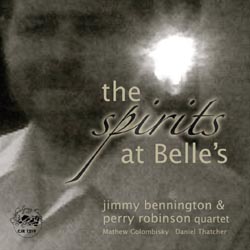Home » Jazz Articles » Multiple Reviews » Burton Greene and Perry Robinson: Two Voices in the Dese...
Burton Greene and Perry Robinson: Two Voices in the Desert; Groder&Greene; The Spirits at Belle's
 |  |  |
Perry Robinson and Burton Greene Two Voices in the Desert Tzadik 2009 | Brian Groder and Burton Greene Groder&Greene Latham Records 2009 | Jimmy Bennington-Perry Robinson Quartet The Spirits at Belle's Cadence 2009 |
It's unfortunate that certain artists are associated so completely with a certain decade or time period that the evolution of their work gets short shrift. Burton Greene, pianist, and Perry Robinson, clarinetist, are two figures who were part of the fire-music explosion in New York during the '60s. But while they've continued recording and—more importantly—growing, the music press hasn't really caught up to the fact that their work encompasses far more than free jazz. Robinson and Greene didn't record together during those heady years, however; it wasn't until the expatriated Greene convened Klezmokum in the early '90s (a mix of Klezmer and avant-garde jazz unlike anything Downtown New York had heard) that he and Robinson began documenting their collaborations.
Two Voices in the Desert is the first appearance of the Robinson-Greene Duo, on a program of music inspired by Jewish and East European folk forms. Most of the music was composed by Sylke Rollig, Greene's collaborator and muse, though a component of the "Desert Suite" features John Zorn's "Eitan." "Syl's Freylekhs" opens the set in a jaunty, frolicking dance, pirouetting and trilling into Greene's pointillist Gymnopedies, which provide a trim, solid counterpoint to woody elisions and fluttering funky jabs. "Lamentation" is comparatively dusky, fragments of filmic minimalism and Greene's patented Romanian Raga progressions insinuate themselves into a starkly exquisite romance. The dance for two returns in "Burty's Freylekhs," which incorporates some of the same figures as the opener into a lush, micro-fantasia of non-Western modes in evocative stairsteps. Flitting ocarina gives a primeval accent to mid-register arpeggios at the outset of "Desert Wanderers" while crisply tiptoeing through its primary, martial melody. While known for extended techniques like rattling the piano's guts such methods aren't a significant part of Greene's textures here: simple, deliberate melodies and their natural exposition with an ear towards subtle tonality is what becomes Two Voices in the Desert.
It's somewhat surprising, on the heels of Greene's Klezmer projects and the uniquely boppish dates he's recently produced for CIMP, that his collaboration with trumpeter Brian Groder harks back to the blowouts of yore. In a quintet with altoist Rob Brown, bassist Adam Lane and drummer Ray Sage, the emphasis is on collective improvisation. However, playing free in this decade is something decidedly different than it was 40-odd years ago, for musicians' technique and knowledge is generally at a much higher level. Groder has a precise, steely tone and his statements are economical—cool, yet full, like a less-brash Ted Curson. It's hard not to reach back in time when hearing Brown boil over as blocky piano motifs and turbulent gut and horsehair pool and shove underneath, but even within those choppy waves, there's a sense of composure directing the ensemble's bombs towards a plotted explosion. Greene mirrors and recombines phrases into dense dialogues in a mutable, cubistic approach to comping. "Hey Pithy, Can you Thropt the Erectus?" is a Greene piece that first appeared on Throptics (CIMP, 1998). It's theatrical and goofy, pre-consciousness yelps and guffaws instead of woodwinds leading the charge into a clunky, musical ape-man walk, considerably more comedic than the existential outpourings of its Underdog subject.
The Spirits at Belle's is a comparatively subdued example of freeform music, placing Perry Robinson in the company of Chicago drummer Jimmy Bennington and bassists Dan Thatcher (Leaf Bird) and Matthew Golombisky for two open pieces and Robinson's "Walk On." Though very little of Robinson's music for clarinet, bass and percussion saw the light of day (save the 1965 Henry Grimes ESP date The Call, from which "Walk On" is culled), one can get a flavor for it here. The opening improvisation begins with middle-register wisps and hymnal fragments coupled with dueling calloused masses. As the bassists pummel and saw, Robinson zips and flutters in Lepidopteran movements, Bennington's loose cymbal accents providing chiaroscuro. There's certainly logic to Robinson's phrases, but it's a very free, athletic range of associations from shrill cries to duck calls, straight-stick swing and chamuleau dips. While not always following directly (few could), the trio of strings and percussion give him a significant canvas and reactive palette with which to work.
Tracks and Personnel
Two Voices in the Desert
Tracks: Syl's Freylekhs; A Lamentation; Burty's Freylekhs; Desert Suite; Song For My Friend Burton; Ella Turtella; Der Kats Zogt A Miowke.
Personnel: Perry Robinson: clarinet, soprano clarinet, wood flute and ocarina; Burton Greene: piano.
Groder&Greene
Tracks: Landfall; Only the Now; Separate Being; Amulet; Cryptic Means; Nigh; Hey Pithy, Can You Thropt the Erectus?; Surmised Wink; Sleepwalker.
Personnel: Brian Groder: trumpet; Burton Greene: piano; Adam Lane: bass; Rob Brown: alto saxophone; Ray Sage: drums.
The Spirits at Belle's
Tracks: The Spirits at Belle's; Albert M; Walk On.
Personnel: Jimmy Bennington: drums; Perry Robinson: clarinet, ocarina; Dan Thatcher: bass; Matthew Golombisky: bass.
< Previous
Brothers in Jazz
Next >
Globe Unity: Russia
Comments
Tags
For the Love of Jazz
 All About Jazz has been a pillar of jazz since 1995, championing it as an art form and, more importantly, supporting the musicians who create it. Our enduring commitment has made "AAJ" one of the most culturally important websites of its kind, read by hundreds of thousands of fans, musicians and industry figures every month.
All About Jazz has been a pillar of jazz since 1995, championing it as an art form and, more importantly, supporting the musicians who create it. Our enduring commitment has made "AAJ" one of the most culturally important websites of its kind, read by hundreds of thousands of fans, musicians and industry figures every month.

















